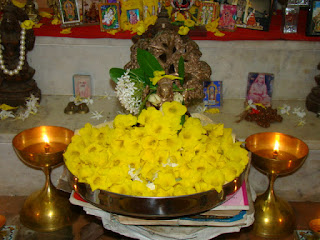Äyuñya-Süktam
Every
human being has come to this world with a pre-destined period. However, because
of our ignorance and abuse/non-use of free-will, we end up living less than the
period that we are allowed. ‘Äyuñya-Süktam’ is a prayer to the Lord to bless us
with long life. After all, whatever a person desires to achieve can be achieved
only in this human life. The incarnation of animals and devatäs are only bhoga-çaréra
and not karma-çaréra. The possibility
of complete longevity by puruñärtha –
self-effort, the full term of life is achieved by specific prayer such as ‘Äyuñya-Süktam’.
The
Süktam has nine mantras praying for long life. The prayer is addressed to
various deities such as Brahmä, Çiva, Sun, and all the celestials who are
guardians of the universe.
Äyuù
= all facets of mental and physical health and nourishment, and thus is the
purpose of this Süktam.
Äyuñyam
= Promoting long healthy prayerful Dhärmic life in every auspicious way. This
is the motive and spirit in which you can listen to or chant this mantra.
All
mantras/süktam cannot be used for homam (fire-ritual). Thankfully, ‘Äyuñya-Süktam’
can be/is used in performing ‘Äyuña-homam’. It is/can be performed on one’s nakñatra-birthday. The whole ritual
could be – Gaëapati-Püjä/homam, Navagraha-homam, Mahä-måtyuïjaya-homam, Bhägya-süktam,
and Äyuñya-homam’. If four Åtviks
(Priests) are performing, each may offer 27 oblations to make a total of 108
oblations for ‘Äyuñya-homam’.
In
the absence of fire-ritual, simple recitation can be done.
***
Text in Roman script with Free Translation
yo
brahmä brahmaëa ujjahära
präëaiç-çiraù kåttiväsäf-pinäké |
éçäno
devas sa na äyur-dadhätu
tasmai juhomi haviñä
ghåtena ||1||
Lord Brahmä (the
Creator) was born from the breath (präëa)
of Brahman. Çiva attired in elephant skin, and wielding His Pinäké (weapon) arose
out of His head. I pray to Lord Brahmä, Lord Çiva for long life by offering
ghee as oblation. (1)
vibhräjamänas-sarirasya
madhyädrocamäno gharmarucirya ägät |
sa måtyupäçän-apanudya
ghorän ihäyuñeëo ghåtamattu devaù ||2||
Lord
Agni, who is fiery bright, and who provides warmth (to sustain life), arose
from the effulgent chest of Brahman. May Lord Agni release us from the dreadful
noose of death (cycle of birth and death). I offer my oblation of ghee. (2)
brahmajyotir brahmapatnéñu garbhaà yamädadhät
pururüpaà jayantam |
suvarëaraà-bhagraham-arkam-arcyaà tam äyuñe vardhayämo ghåtena ||3||
The radiance of
Brahman gave birth to the victorious golden-orbed Lord Sun. May Lord Sun grant
us long life. I offer my oblation of ghee to Him.(3)
çriyaà-lakñmém-aubaläm-aàbikäà-gäà ñañöéà ca
yäm-indrasenetyudähuù |
täà-vidyäà brahmayonigà sarüpäm-ihäyuñe tarpayämo ghåtena ||4||
I offer ghee as
oblation to Goddess Lakñmé, as the embodiment of treasure of knowledge, whose
source is Brahman, and who is addressed by six names - Çré, Lakñmé, Aubalä, Aàbikä,
Gäm, and Indrasenä. May she grant us long life. (4)
däkñäyaëyas-sarvayonyas-sa yonyas-sahasraço
viçvarüpä virüpäù |
sasünavas-sapatayas-sayüthyä
äyuñeëo ghåtam-idaà juñantäm
||5||
I offer ghee as
oblation to Däkñäyaëé, the Universal Mother (Daughter of Dakñha), and all the
gods and celestials who are her descendants. May they grant us a long life. (5)
divyä gaëä bahurüpäf-puräëä äyuçchido naf-pramathnantu virän |
tebhyo juhomi bahudhä ghåtena mä naf-prajägà rériño mota
virän ||6||
I
offer ghee as oblation to the divine Gaëas and their various forms (bahurüpä), so that they remove all
obstacles, which come in the way of our long life. May those divine Gaëas
protect our valiant children. (6)
ekaf-purustät ya idaà babhüva yato babhüva bhuvanasya gopäù |
yam-apyeti bhuvanagà säàparäye sa no havir-ghåtam-ihäyuñettu
devaù ||7||
vasün rudrän-ädityän maruto’tha sädhyän
åbhün yakñän gandharvägçca pitågçca viçvän |
bhågün sarpägçcäìgiraso’tha sarvän
ghåtagà hutvä sväyuñyä mahayäma çaçvat ||8||
9. viñëo tvan no antamaççarmayacchasahantya |
pratedhärä
madhuçcuta utsam duhrate akñitam ||
9.
O Lord Viñëu! I offer my oblations to You by incessent and melodious chanting
of the mantras. Kindly be with us,
and bestow upon us, abiding happiness and long life.
oà çäntiççäntiççäntiù
Om Peace Peace Peace
***















